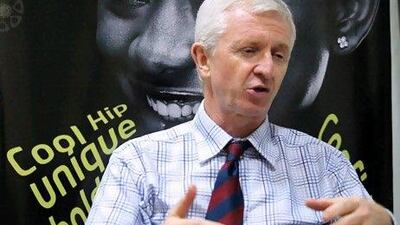Benedict Arafin rates his most important possessions as his car and his mobile phone.
His car enables him to earn a living as a driver in Lagos, Nigeria's largest city and commercial capital. His phone allows clients to tell him when and from where they need collecting.
"My car is my office, and my phone is my briefcase," says Mr Arafin. "If I didn't have a car, my phone would help me find another job. I couldn't live without a phone."
Mr Arafin is one of the 100 million mobile phone subscribers in Nigeria, Africa's biggest telecommunications market. It is the latest frontier in the industry's effort to sell phones and network services, growing at 10 per cent per year, three times the rate of Western Europe.
In a country where the fixed-line network passed most people by, a growing number of Nigerians are enjoying the new-found ability to communicate easily with customers, friends and family.
So lucrative are the returns up for grabs that Etisalat joined the market, becoming Nigeria's fourth major operator in 2008. As the fastest-growing operator, it is now catching up quickly, with a market share of 10 per cent.
"We have a very aggressive set of targets and are looking at, between 15 and 16 million subscribers by the end of this year. We are on track to achieve that," says Steven Evans, the chief executive of Etisalat Nigeria.
But while the potential rewards are high, so are the obstacles.
First there is the challenge of securing enough power to support a network. Unlike in the UAE, mobile phone companies in Nigeria cannot simply plug into the national grid to run their services.
Instead, they must set up costly generators to power their thousands of cell sites, which house antennas and other electronic equipment. MTN Group, the largest operator, has three generators at each site - one in use, one for back-up, and another in case of emergencies. More cash goes to pay for the diesel to fuel the generators.
There is also the risk of sabotage. MTN says that it faces about 70 cuts a month through its fibre-optic networks nationwide as well as threats of further disruption from criminal gangs and corrupt community groups that run huge protection rackets.
Protecting networks requires further costs. Etisalat Nigeria employs about 10,000 security guards across the country to minimise service interruptions.
Mr Evans estimates that the total outlay accounts for 15 to 20 per cent of its network's operating costs.
"It would probably feed through to prices ultimately if we were able to save that," he says.
The regulator has shown little sympathy.
In May, Etisalat and MTN were both handed 360 million naira (Dh8.2m) fines by Nigeria's communications commission for falling short of service standards. For the same reason, the telecoms regulator also fined Bharti Airtel, an Indian firm, and the local company Globacom 270m naira and 180m naira respectively.
In an effort to raise customer service levels, operators are now ploughing billions of dollars into making networks faster and extending coverage beyond urban areas. Much of the investment is in anticipation of 3G data services, the next phase of growth.
Operators are excited because 3G usually generates higher profits, while for many customers it will offer their first taste of regular internet access.
"The focus is shifting from getting people connected to getting further revenues by email services, social networks and browsing," says Thécla Mbongue, a senior research analyst at Informa Telecoms and Media.
But getting more people to use data is easier said than done.
Mr Arafin estimates he spends just US$7 (Dh25) a month on calls and SMS - typical for an average user. He does not have internet capability on his Nokia handset.
But then, data usage accounts for an average of only 60 cents of the revenue that operators make per user each month.
Of the 5 million data users in the country, most are middle class. The high cost of smartphones make them out of reach for many consumers in a market that is predominantly prepaid.
But analysts are hopeful that the move to data will accelerate from a trickle to a flood for two reasons.
First, cheaper Android smartphones from Chinese handset makers are offering consumers an alternative to similar devices from BlackBerry, Samsung and Nokia. Secondly, the middle class in Africa's most populous country is growing. The number of Nigerians who can be considered lower middle class or above rose by 7 million to 64 million people between 2004 and last year, government figures show.
If that wealth begins to trickle down, Mr Arafin may soon be emailing, rather than calling his clients to arrange pick-ups.

